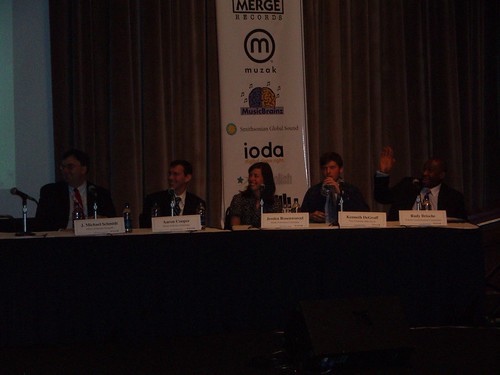Michael Bracy Policy Director/Co-founder, Future of Music Coalition
Rudy Brioche Legal Advisor, Federal Communications Commission
Aaron Cooper Counsel, Senate Judiciary Committee
Kenneth DeGraff Senior Policy Advisor, Vice-Chairman Mike Doyle
Jessica Rosenworcel Senior Communications Counsel, Senate Commerce Committee
J. Michael Schmidt Legislative Assistant, Office of Senator Feingold

On panel from left to right: MS, AC, JR, KD, RB
MB as moderator
11:34 AM EST - MB: Radio, there are a lot of issues, new platforms. The big question is concerning media ownership, where are we in the process of it?
RB: We are trying to move the item up to the end of this year, earlier next year. Studies were released about ownership and they need to look at the questions more deeply. How far are we willing to go and to make sure we have a fair process. If we think about consolidation, what impact is that going to have on the diversity on programs? The public is an important influence in order to help move things along.
11:39 AM EST - MB: They are saying in order to compete, they need more stations. How does that hold at all?
RB: Members of congress support that idea. On one hand, in order to compete they need more stations, on the other hand, it can be seen as a separate market. If we deal with this idea, we necessarily don't have to have that divide. Diversity is a big issue at hand as well.
11:44 AM EST - JR: We're dealing with major changes right now. Things have really changed because of the1996 with the telecommunications law. As a result, the top four corporations own 50% of radio share, of the top ten, they have two-thirds of the market.
Speakers make it a point to emphasize how important the public's voice is.
RB: If it wasn't for organizations such as FMC, with the federal state to get independent stations in the open, however this is only the first step.
11:51 AM EST - MB: Any thoughts on LPFM?
KD: These stations can really help groups such as churchs, schools, targeted to specific audiences that do not compete with the majors. In 2001 Congress chose to limit those stations. The majors thought LPFM would interfere with their station; number of studies that have been done reveal that this is not the case. These stations can also play and support the independent bands.
AC: One thing that doesn't happen enough is the communication between content and audience. There are 2 major issues at this. First, the protection of IP rights. It is valuable and the industry has been very successful. The bigger picture is how it helps the country. Second, there is a need to take a step back and look at the issues at hand: look at who/what gets paid from digital music. Are the rate structures adequate? It's about finding the right balance, having the stations that can serve the audience where traditional radio does not.
12:03 PM EST - On the topic of broadband, net neutrality.
KD: We need to find out where potential abuses are happening. Defining abuses in the future can also get more technical for the future.
12:05 PM EST - Audience questions.
HS (Prometheus radio project): For net neutrality, Congress has started discussing the issues at hand. Department of Justice has denied problems with net neutrality; what can people do to help bring awareness and specifically make sure the issue with D of J doesn't happen again?
AC: There are 2 policy issues they are looking at. One is labels/artists should be compensated and how. Two, they don't want to impede on creative restrictions that following with internet. It needs to be recognized that if rates can't be met, it's everyone's problem (artists, webcasters labels).
WM: What are the copyright issues with orphaned works?
AC: It is still being addressed, it is the senator's top priority for reform. It is taking a lot of time because so many things effect rates and decisions. There is a need to look at the entire playing field.
MB: Any predictions? Specifically before the next election.
AC:Targeted bills such as LPFM is a big issue for senator.

No comments:
Post a Comment